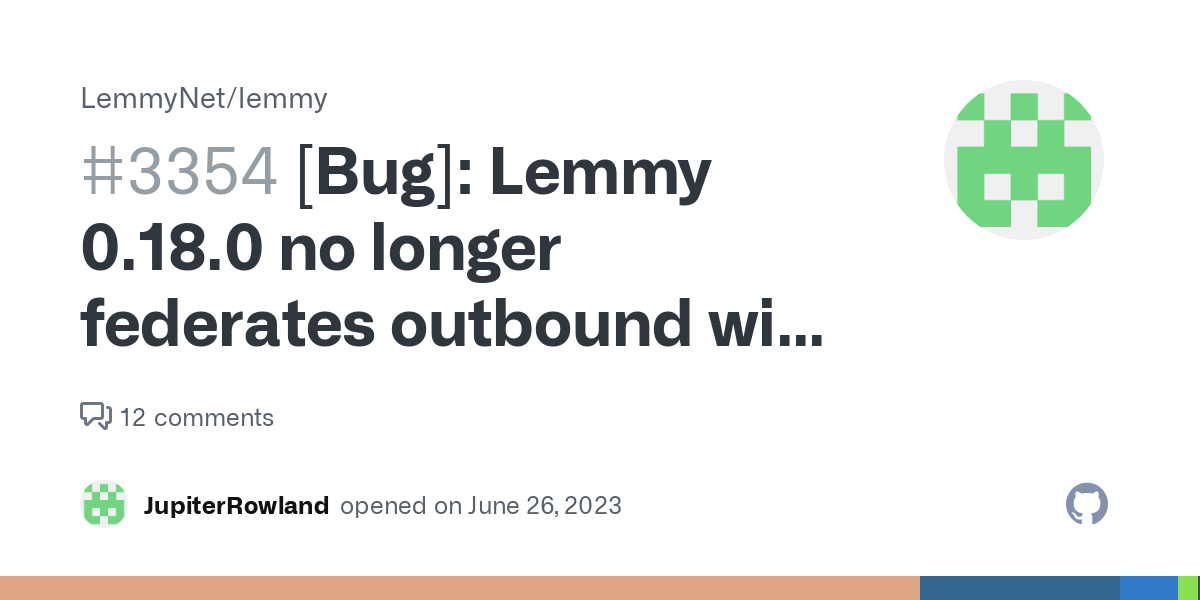Does it come with a coupon for their hitman service too?
Linux server admin, MySQL/TSQL database admin, Python programmer, Linux gaming enthusiast and a forever GM.
- 7 Posts
- 372 Comments

 4·11 days ago
4·11 days agoEven if this manages to pass, it’d only apply to those currently in or candidating for the Senedd. This wouldn’t affect the UK government (and thus Farage) at all, even if he were attempting to get re-elected.
At every step in the process, it looked to those around me that whatever I was using was going to be used forever. I didn’t set any lofty goals
This is absolutely the right approach, even if you were planning to quit from the start (not the case with you, but still). “This is my last ever cigarette” just caused me to delay and delay and delay. The only realistic way to do it for me was one craving at a time (“I’m not smoking for the next hour”), then a day at a time. Handling the hours and days was hard, but once you do that the weeks and months take care of themselves.
Vaping for me was a major misstep. Just caused me to consume more nicotine than when I was smoking.
There’s two separate addictions going on with smoking: habit and chemical. What patches, nicotine gum, etc are trying to help people do is tackle them separately.
This means you can focus on getting out of the habit of lighting up after a coffee, or after a meal, or whatever triggers you had, while delaying the chemical withdrawal which seriously messes with your head until later. Tackling the two seperately is easier for many people.
With that said, patches don’t work for everyone, and I hope you find the cessation aid (if any) that works for you. Quitting smoking is an absolute bitch.
For me personally, the most helpful aid was nicotine gum, and then swapping out the nicotine gum for normal gum once I was confident I’d kicked the habit part and could focus on the chemical withdrawal.
The kitchen is operated by volunteers and rely on donations and food banks. I Believe this is also common practice in many temples within India proper.
Here’s a great little mini-documentary on that I saw on exactly that a few months back. Sikh temples seem amazing in terms of the sheer numbers of people they feed with no limiting criteria.
Lol, took me a minute to figure out you’re literally talking about a football match happening now. I was re-reading my comment thinking “Wait, what’s this got to do with Ukraine? Did the Romanian government do something that hit the news I don’t know about? What does this mean?!?” xD
Probably most countries think so of themselves.
Funnily enough, Romanians are the exact opposite in this regard. Romanians tend to think that Romania is terrible, backwards, and filled with awful people. That isn’t exactly the case (like any country, it has it’s pros and cons, and there’s a lot we need to work on) but it is how they tend to see it.

 12·16 days ago
12·16 days agoBelarus revealed the plans at the beginning of the war to go into Moldova right after Ukraine, so yes. That was exactly the plan

 34·16 days ago
34·16 days agoWhile most people are understandably pumped about the accession talks withs Ukraine, I think I can speak for the majority of Romanians when I say that this is an amazing step towards safety and security for Moldova. Our little brother deserves more than just being used as a political battleground by Russia.

 1·17 days ago
1·17 days agoEven the question of “who” is a fascinating deep dive in and of itself. Consciousness as an emergent property implies that your gut microbiome is part of the “who” doing the thinking in the first place :))

 2·17 days ago
2·17 days agoSo, first of all, thank you for the cogent attempt at responding. We may disagree, but I sincerely respect the effort you put into the comment.
The specific part that I thought seemed like a pretty big claim was that human brains are “simply” more complex neural networks and that the outputs are based strictly on training data.
Is it not well established that animals learn and use reward circuitry like the role of dopamine in neuromodulation?
While true, this is way too reductive to be a one to one comparison with LLMs. Humans have genetic instinct and body-mind connection that isn’t cleanly mappable onto a neural network. For example, biologists are only just now scraping the surface of the link between the brain and the gut microbiome, which plays a much larger role on cognition than previously thought.
Another example where the brain = neural network model breaks down is the fact that the two hemispheres are much more separated than previously thought. So much so that some neuroscientists are saying that each person has, in effect, 2 different brains with 2 different personalities that communicate via the corpus callosum.
There’s many more examples I could bring up, but my core point is that the analogy of neural network = brain is just that, a simplistic analogy, on the same level as thinking about gravity only as “the force that pushes you downwards”.
To say that we fully understand the brain, to the point where we can even make a model of a mosquito’s brain (220,000 neurons), I think is mistaken. I’m not saying we’ll never understand the brain enough to attempt such a thing, I’m just saying that drawing a casual equivalence between mammalian brains and neural networks is woefully inadequate.

 52·18 days ago
52·18 days agoThat’s a strong claim. Got an academic paper to back that up?

 6·18 days ago
6·18 days agoThis is why I strictly refer to these things as LLMs. That’s what they are.

 24·19 days ago
24·19 days agoI’m happy with the Oxford definition: “the ability to acquire and apply knowledge and skills”.
LLMs don’t have knowledge as they don’t actually understand anything. They are algorithmic response generators that apply scores to tokens, and spit out the highest scoring token considering all previous tokens.
If asked to answer 10*5, they can’t reason through the math. They can only recognize 10, * and 5 as tokens in the training data that is usually followed by the 50 token. Thus, 50 is the highest scoring token, and is the answer it will choose. Things get more interesting when you ask questions that aren’t in the training data. If it has nothing more direct to copy from, it will regurgitate a sequence of tokens that sounds as close as possible to something in the training data: thus a hallucination.

 2·19 days ago
2·19 days agoIf he has said otherwise I’m open to being corrected, of course.
I went back to double-check what I’d heard from the horse’s mouth. I misunderstood the first time (they had just finished talking about Rwanda). This was in relation to third country processing of migrants.

 4·19 days ago
4·19 days agoLabour are promising the biggest expansion of workers’ rights in decades and the most ambitious environmental policies
You made me interested in what exactly they’re promising, so I tracked down their manifesto.
The fines on river and ocean polluting sounds long overdue. Hardly revolutionary (every EU country does this) but it’s definitely needed from some headlines I’ve read. There’s also some stuff there about taxing oil and gas companies. That’s honestly a good thing! Wouldn’t exactly call that incredibly ambitious though.
EDIT: My eyes completely glossed over the “Clean Power by 2030” investment plan somehow. That sounds pretty great, and definitely counts as ambitious. My napkin math says 95 GW of electricity could power about 18 million homes, which according to this is more than half of UK homes. Pretty ambitious.
I couldn’t find anything in there about workers’ rights though. Maybe I missed something?
EDIT2: Why wasn’t Starmer mentioning any of this in the debate, I wonder?

 2·19 days ago
2·19 days agoFair enough. So if I understand you correctly, this isn’t really about Labor having any positive policies, but more that they won’t actively make things much worse.
Btw, on the Rwanda plan, didn’t Starmer say in the debate he’d do that if it complied with international law? EDIT: I’m wrong, he said he’d do third country processing of migrants if it complied with international law.

 36·19 days ago
36·19 days agoNot British, but interested in your opinions: isn’t Labor almost as bad as the Tories these days? I watched the Sunak - Starmer debate, and they seemed to just be angrily agreeing with eachother on every point that mattered. There was a lot of “Yes, we should do that, but your track record shows you’re not serious about [policy]!”
No, I’m not talking about the 1936 constitution. I meant specifically the disempowerment of local and union soviets.
I’m no expert on Russian history, so I may be misinformed about this, but as far as I understand it he put in place a series of reforms that stripped power from the local level and empowered the central committee.











How do you ever solve a problem if you don’t acknowledge it exists?
I’m not from the US, but live in a country that is a US ally with a lot of military bases. The US election effects us. The fact the DNC is fielding an old age pensioner who should be sitting comfortably in a retirement home complaining about the birds obstructing his view against an equally old fascist is deeply worrying.